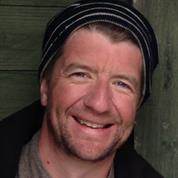Christoph Warrack reflects on the inspiration for Airbase, a digital platform enabling any premises to host courses of learning, which has just been awarded an RSA Catalyst grant. Airbase brings together hosts, teachers and students, and makes it easy for creative and skills development to happen anywhere.
In October 2016, through a series of coincidences, I moved with my family to occupy a converted barn in Sussex. The site had been acquired by villagers next door, the impact investors Barnaby and Cassandra Wiener (both now FRSA), from the Mullins family. These included in their number Gwen Mullins, a crafts pioneer involved in the founding of the Crafts Council, and her daughter Barbara, who led a flourishing local weaving cooperative in the building for 50 years until her death in 2015.
The Wieners were eager to return the site to its former purpose as a craft skills centre. And I found long-held but unformed ideas beginning to surface and coalesce. I had grown up in a land-owning family in Yorkshire, where I was struck by the unexplored potential of many of the buildings there. Country houses had for centuries been engines – however archaic – of the local economy. Beyond their continuance as family homes, they also seemed like white elephants of utility to pheasant or film shoots.
Elsewhere in Yorkshire, meanwhile, Roger Tempest had inherited a house in which, as he observed to a conference in Westminster that I filmed in 2005, “there was frost on the billiard table, and the house was too damp to burn down”. He set about converting outbuildings into world-class office spaces, with the handsomely refurbished assets now hosting more than 50 businesses. He then founded the consultancy Rural Solutions to make the model more widely available.
I’d lost count of the amount of times I’d told this story – because, to me, of its brilliance and importance, if you can overlook the feudal shading. It’s a rationale now widely applied by rural landowners, with innovations restoring these estates to their role as engines of economy for a new and less feudal century. Cass and Barnaby wanted to do something similar with their buildings: bringing artists and crafts practitioners to work and teach either local people or those from urban or support environments. I knew that some simple technology would help them manage the process; recognising its wider applicability, they made an investment in return for a share of the company.
The name Airbase came from ‘artist-in-residence base’, but I like it because, like my first social venture, Open Cinema (Scaling Catalyst 2016), it uses tech to catalyse the offline, real-world, place-based. Airbase. The software has been in development since January this year in Gaza, in collaboration with Founders & Coders and Gaza Sky Geeks. The first trial takes place in Exmoor this July, with further venues, rural and urban, joining from August.
The award of a Catalyst grant will help us develop partnerships with national training providers, such as The Poetry Society, with an interest in the distributive qualities of this model. I hope we can encourage a new flourishing of local learning and economic viability, protecting communities and their skills. I’d be delighted to hear from fellows interested to teach at Airbase venues, or with ideas on further potential of the model. And I look forward to reporting further as we build and learn.

Be the first to write a comment
Comments
Please login to post a comment or reply
Don't have an account? Click here to register.